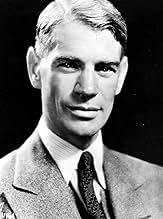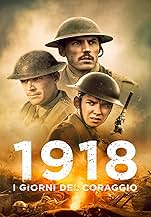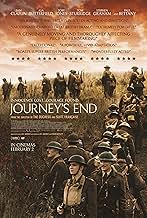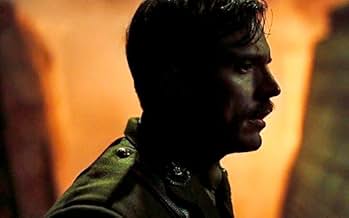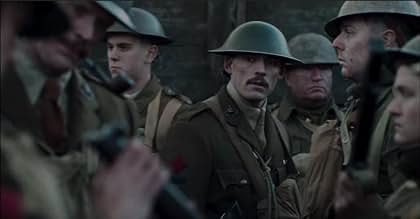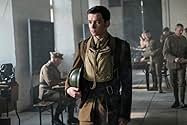IMDb-BEWERTUNG
6,7/10
11.962
IHRE BEWERTUNG
Es spielt in einem Unterstand in der Aisne im Jahr 1918 und erzählt die Geschichte einer Gruppe britischer Offiziere, angeführt von dem sich geistig auflösenden jungen Offizier Stanhope, die... Alles lesenEs spielt in einem Unterstand in der Aisne im Jahr 1918 und erzählt die Geschichte einer Gruppe britischer Offiziere, angeführt von dem sich geistig auflösenden jungen Offizier Stanhope, die auf ihr Schicksal warten.Es spielt in einem Unterstand in der Aisne im Jahr 1918 und erzählt die Geschichte einer Gruppe britischer Offiziere, angeführt von dem sich geistig auflösenden jungen Offizier Stanhope, die auf ihr Schicksal warten.
- Auszeichnungen
- 4 Gewinne & 3 Nominierungen insgesamt
Empfohlene Bewertungen
I just want to provide a quick calibration of what people should expect from this movie because some of the reviewers seem to have had a misconception of what this movie was supposed to be about. This is not a war movie - it's a movie about war. Specifically, the affects of trench warfare on a group of soldiers. Too that end, the movie is absolutely brilliant from the moment it begins to the moment it ends. You will not see long drawn out battle scenes, hand to hand combat, fire-fights, bloody carnage or anything else you've recently seen in Hacksaw Ridge, Lone Survivor or Fury. What you will see is the persistent and inevitable deterioration of the innocence and humanity of the characters as their fate, which they all know is coming, slowly but surely creeps up on them from one day to the next. Many other reviewers have used the term, "disturbing", to describe this movie and I agree 100%. It is highly disturbing, on a psychological level. You won't leave this movie feeling good or motivated to join the military; you will leave it with a loss to understand why humanity ends up in situations like this to begin with.
"Journey's End" takes place in the trenches of the Western Front in 1918. It was originally a very successful stage play in 1928 starring Lawrence Olivier in what must have been one of his first leading roles. In 1930 a film version was produced, one of the earliest British "talking pictures", directed by James Whale and starring Colin Clive (soon thereafter both were to re-team in the memorable films, "Frankenstein" and "Bride of Frankenstein).
The above is worth pointing out because the 1930 version which is still available for viewing on Youtube, makes an interesting comparison with this current production of the same story. That is because, meticulous as this production is, it was produced a century after the events depicted in the film. To the makers of this version, this material is ancient history. To the makers of the 1930 version, it was only a dozen years ago. Indeed, James Whale, who directed the 1930 film, actually had been a British officer on the Western Front during World War I. Consequently, to him, getting the details and the atmosphere right was not a matter of researching historical records, he had only to search his own memory.
Apart from the color photography and the differences in acting styles, one big difference is that the 1930 version had a lot more humor in. While the 2017 version seems unrelentingly grim, the characters in the 1930 version exhibit a lot more of the sort of dark humor that one might expect from troops in the front lines. It is almost as though that aspect of the play did not occur to the director, or else he had simply ignored it. Either that, or perhaps that sort of humor is now considered "politically incorrect".
Nevertheless, "Journey's End" is a highly evocative depiction of the Great War, and well worth seeing in this, the centennial of the end of "The War to End ALL Wars".
The above is worth pointing out because the 1930 version which is still available for viewing on Youtube, makes an interesting comparison with this current production of the same story. That is because, meticulous as this production is, it was produced a century after the events depicted in the film. To the makers of this version, this material is ancient history. To the makers of the 1930 version, it was only a dozen years ago. Indeed, James Whale, who directed the 1930 film, actually had been a British officer on the Western Front during World War I. Consequently, to him, getting the details and the atmosphere right was not a matter of researching historical records, he had only to search his own memory.
Apart from the color photography and the differences in acting styles, one big difference is that the 1930 version had a lot more humor in. While the 2017 version seems unrelentingly grim, the characters in the 1930 version exhibit a lot more of the sort of dark humor that one might expect from troops in the front lines. It is almost as though that aspect of the play did not occur to the director, or else he had simply ignored it. Either that, or perhaps that sort of humor is now considered "politically incorrect".
Nevertheless, "Journey's End" is a highly evocative depiction of the Great War, and well worth seeing in this, the centennial of the end of "The War to End ALL Wars".
What a contrast to so much mediocrity and worse eg. Dunkirk. Set in the trenches in March 1918 but not really about the trenches or March 1918 at all.
Superbly cast and acted, a beautifully written reflection of a junior officer's view of the penultimate stages of WW1. Even more, this is a beautifully written reflection on the human spirit in adversity. Of course some of the senior officers are somewhat caricatured - that is what happens in real life. Of course it becomes more and more difficult with the passage of time for people to understand the mentality of empire, the public schoolboy ethos embodied by Raliegh, Maybe the same bravado and fear affects people joining violent gangs - I know not - but Raleigh is about the same age as some gang members - 18/19. Stanhope at 21/22 is a veteran of war, Uncle (Osborne - quite possibly early 30s) almost a veteran of life in their eyes.
Of course such characters have been used in films since - but this was written in 1928. It cut the new ground - others have followed.
The Roman Horace said "Dulce et decorum est pro patria mori." and it took until WW2 for Patton to say "The object of war is not to die for your country but to make the other bastard die for his." But what about sending your friends, your very best friends, your nearest and dearest to near certain death. What does that "do" to a man. Stanhope knows and through this film we can maybe glimpse that horror. What happens when there is no "cunning plan" left. Uncle knew.
Hold them off for as long as you can. In 1914, in 1918 when Journey's End is set, and again at Dunkirk ordinary men really did. No doubt there are countless other examples both before and in the last 70 years.
This film is a fitting tribute to those men.
Superbly cast and acted, a beautifully written reflection of a junior officer's view of the penultimate stages of WW1. Even more, this is a beautifully written reflection on the human spirit in adversity. Of course some of the senior officers are somewhat caricatured - that is what happens in real life. Of course it becomes more and more difficult with the passage of time for people to understand the mentality of empire, the public schoolboy ethos embodied by Raliegh, Maybe the same bravado and fear affects people joining violent gangs - I know not - but Raleigh is about the same age as some gang members - 18/19. Stanhope at 21/22 is a veteran of war, Uncle (Osborne - quite possibly early 30s) almost a veteran of life in their eyes.
Of course such characters have been used in films since - but this was written in 1928. It cut the new ground - others have followed.
The Roman Horace said "Dulce et decorum est pro patria mori." and it took until WW2 for Patton to say "The object of war is not to die for your country but to make the other bastard die for his." But what about sending your friends, your very best friends, your nearest and dearest to near certain death. What does that "do" to a man. Stanhope knows and through this film we can maybe glimpse that horror. What happens when there is no "cunning plan" left. Uncle knew.
Hold them off for as long as you can. In 1914, in 1918 when Journey's End is set, and again at Dunkirk ordinary men really did. No doubt there are countless other examples both before and in the last 70 years.
This film is a fitting tribute to those men.
Decided to watch this with my 13 year old son as he's learning about WW1 at school and I thought this may give him an insight as to how trench warfare would have felt for the men involved. He is a massive fan of all action cinema/TV from LOTR to GOT, and although I was completely involved in the film and felt the despair of every man on the front line, I feared that Zach might be disinterested as it was far more atmospheric than all out action. When we discussed certain aspect during the film he told me that his heart rate had been at about 120 bpm all the way through and that he was loving it. Tells you everything you need to know about this film. As stated before, this is not a war film, but a film about war and we loved it.
Aisne 1918, Officer Stanhope is in charge of a group of men, who are in a bunker, awaiting a heavy German attack, only Stanhope's mental health is declining rapidly.
I've grown so accustomed to big budget war films, and there are many I have loved, Journey's End may not match them on special effects or extras or lavish battle scenes, but one thing it does have, is an incredible story.
The story of the mental decline of the leading man, Officer Stanhope, who's trying hard to keep it together in an impossible situation, alcoholism and paraboia. It's almost impossible to put yourself in place if one of those men, and imagine the torment, waiting to be attacked whist in a confined space.
A wonderful mix if characters, from the struggling Hibbert, to the avuncular Osborne, and of course the sarcastic Mason, all I kept thinking of was Baldrick from Blackadder 4, some wonderful, sharp one liners.
What a wonderful cast here, Paul Bettany, Stephen Graham, Toby Jones and many more, all spot on, very sincere performances, characters you can actually believe in.
It's subtle, no heavy accompanying music, no lavish special effects, it relies instead on the art of storytelling. They got the claustrophobia of the trenches spot on, as you watch you almost feel short of oxygen.
I thought this was quite an impressive film.
9/10.
I've grown so accustomed to big budget war films, and there are many I have loved, Journey's End may not match them on special effects or extras or lavish battle scenes, but one thing it does have, is an incredible story.
The story of the mental decline of the leading man, Officer Stanhope, who's trying hard to keep it together in an impossible situation, alcoholism and paraboia. It's almost impossible to put yourself in place if one of those men, and imagine the torment, waiting to be attacked whist in a confined space.
A wonderful mix if characters, from the struggling Hibbert, to the avuncular Osborne, and of course the sarcastic Mason, all I kept thinking of was Baldrick from Blackadder 4, some wonderful, sharp one liners.
What a wonderful cast here, Paul Bettany, Stephen Graham, Toby Jones and many more, all spot on, very sincere performances, characters you can actually believe in.
It's subtle, no heavy accompanying music, no lavish special effects, it relies instead on the art of storytelling. They got the claustrophobia of the trenches spot on, as you watch you almost feel short of oxygen.
I thought this was quite an impressive film.
9/10.
Wusstest du schon
- WissenswertesPlaywright R.C. Sherriff had seen first-hand the effect of years of war on his friends and knew the fear and terror of waiting for an impending attack, waiting for his journey's end. The characters in the play are a reflection of the men Sherriff had served with in the 9th Battalion of the East Surrey Regiment.
- PatzerA common misconception is the myth about having your chinstrap unbuckled. It is mainly an American thing that was spread in WW2. Fact is, if the concussion was strong enough to hurt your neck or face because your chinstrap was buckled, the force of the same concussion would more than likely kill you. Having your strap undone just meant you would spend a lot of time holding your helmet on while moving fast.
- Zitate
Lieutenant Osborne: Every little noise up there, makes me feel sick.
- VerbindungenFeatured in Projector: Journey's End (2018)
- SoundtracksElevation
Written and performed by Hildur Guðnadóttir
Top-Auswahl
Melde dich zum Bewerten an und greife auf die Watchlist für personalisierte Empfehlungen zu.
- How long is Journey's End?Powered by Alexa
Details
Box Office
- Bruttoertrag in den USA und Kanada
- 161.796 $
- Eröffnungswochenende in den USA und in Kanada
- 11.798 $
- 18. März 2018
- Weltweiter Bruttoertrag
- 970.809 $
- Laufzeit1 Stunde 47 Minuten
- Farbe
- Seitenverhältnis
- 1.85 : 1
Zu dieser Seite beitragen
Bearbeitung vorschlagen oder fehlenden Inhalt hinzufügen






